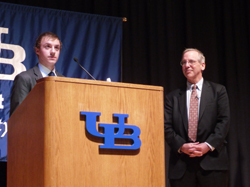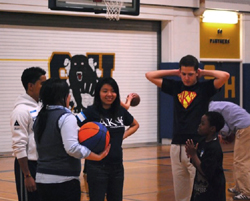Stepping Up...Celebrating those who make a difference to the School of Management
Expanding horizons through student clubs

Sophomore Daniel Gengo, president of Delta Sigma Pi, presents a thank-you gift to William Dudley at the Fed president's UB speech last fall (see Start-Ups). (Photo: Jeffrey Smith, New York Fed)
The School of Management encourages students to round out their education by taking advantage of the many opportunities that exist outside the classroom. Student clubs are a great way to broaden horizons and gain real-world experience.
Whatever their reasons for joining-academic advancement, social opportunities, community service-School of Management students can find a club that suits their needs, says Christopher Salem, an undergraduate advisement associate who serves as chief liaison between the clubs and the school.
"This year, there are 17 recognized student clubs in the School of Management, covering a wide variety of interests and activities," he says.
Some clubs are specific to certain majors, like the UB Accounting Association and the Management Information Systems Association. Others, like Beta Alpha Psi and Alpha Kappa Psi, are chapters of national business-related fraternities. Still others are focused on specific groups of students, such as the Women MBA and the Minority Management Alliance.
Arjang Assad, dean of the School of Management, is a strong advocate for student participation in clubs.
"Clubs are an important aspect of any business school because they are run by the students," Assad says. "Students get to exercise leadership, much like they'll be doing in the business world, and they learn how to work with their colleagues on specific goals."
Nathanael Carbrey, MBA '12, says he has gained valuable experience as president of Beta Alpha Psi. "I've developed my interpersonal and time management skills, and I've learned how important it is to have effective and timely communication," he says. "Leading Beta Alpha Psi has expanded my perception of how information flows within organizations, and how crucial the leadership roles are for an organization's growth and success."
The benefits to students cannot be underestimated, Assad says. "Employers look beyond a student's academic record. Student activities are one of the primary areas in which they can shine."

Alpha Kappa Psi ran a basketball tournament for Big Brothers Big Sisters of Erie County.
One way the clubs contribute to the School of Management's emphasis on real-world learning is by bringing in guest speakers. The academic-based clubs excel in this area, hosting many professionals from specific fields. The Society for Human Resource Management held monthly presentations in the fall featuring HR professionals on a variety of topics, including labor relations and culture change in organizations.
"These events can be valuable for both the students and the speakers," Salem says. "The students benefit because of what they learn from the professionals, and the professionals get a chance to meet our students and tell them about opportunities at their companies."
The Financial Management Association (FMA) also has brought in numerous alumni speakers, including Tom Cogan of Citi, Andrew Peer of PricewaterhouseCoopers, Greg Duval of HSBC, Jim Henry of First Investors and Joost Vles of Moog.
"We also visit companies, help students network and give them experience through competitions and business simulations," says FMA president Kevin Caballes.
Many of the clubs play an active role in the various case competitions held at the School of Management. In fact, the annual Target Undergraduate Case Competition will be renamed the Target Club Competition this year, with teams made up of representatives from the various clubs.
"Corporations often find student clubs a natural point of entry when they are recruiting employees, and events such as case competitions can help them identify the very best candidates," Salem says.
Community service also is a high priority for the student clubs, with nearly all the student organizations requiring a certain amount of service hours by their members.
"Last year, student clubs ran more than 100 service projects to benefit the region," Salem says. "For example, 30 members of Pi Sigma Epsilon helped refurbish three different Habitat for Humanity houses, and the UB Accounting Association collected more than 200 pounds of food for the Food Bank of Western New York."

Graduate Management Association officers (from left) Chris Balon, MBA '11, Katrina Bytschkow, MBA '12, Ore Ajakaiye, MBA '11, and Rahul Chopra, MBA '11, spearheaded this year's Toys for Tots drive.
Other groups' service projects have included working at the City Mission, volunteering with Big Brothers Big Sisters of Erie County, participating in the American Cancer Society's Relay for Life and UB's Linda Yalem Safety Run, organizing Toys for Tots drives, running clothing and blood drives, and dozens of other projects.
One of the biggest annual community service endeavors is the Volunteer Income Tax Assistance (VITA) program run by Beta Alpha Psi. Over the past three years, IRS-certified students have prepared more than 1,700 tax returns for low-income families in Western New York, resulting in nearly $2 million in tax refunds. It was recognized as the largest Beta Alpha Psi-run VITA program in the nation last year, based on the number of volunteers who contributed at least five hours of service.
"This type of service greatly enhances the School of Management's reputation, both locally and nationally," Salem says.
The many opportunities clubs offer can help students develop into the well-rounded and leadership-ready candidates that employers seek. This not only benefits the students, but also contributes to the School of Management's high placement rate for its graduates.
Salem has accepted a challenge from the dean to get more students involved with School of Management clubs. "There are just so many benefits, both for the students and the school, that we want to see as many students involved as possible," he says.
